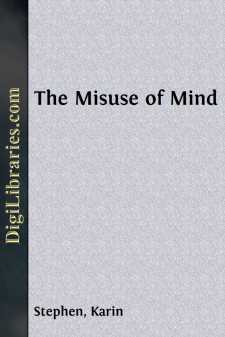Categories
- Antiques & Collectibles 13
- Architecture 36
- Art 48
- Bibles 22
- Biography & Autobiography 813
- Body, Mind & Spirit 142
- Business & Economics 28
- Children's Books 15
- Children's Fiction 12
- Computers 4
- Cooking 94
- Crafts & Hobbies 4
- Drama 346
- Education 46
- Family & Relationships 57
- Fiction 11828
- Games 19
- Gardening 17
- Health & Fitness 34
- History 1377
- House & Home 1
- Humor 147
- Juvenile Fiction 1873
- Juvenile Nonfiction 202
- Language Arts & Disciplines 88
- Law 16
- Literary Collections 686
- Literary Criticism 179
- Mathematics 13
- Medical 41
- Music 40
- Nature 179
- Non-Classifiable 1768
- Performing Arts 7
- Periodicals 1453
- Philosophy 64
- Photography 2
- Poetry 896
- Political Science 203
- Psychology 42
- Reference 154
- Religion 513
- Science 126
- Self-Help 84
- Social Science 81
- Sports & Recreation 34
- Study Aids 3
- Technology & Engineering 59
- Transportation 23
- Travel 463
- True Crime 29
The Misuse of Mind
by: Karin Stephen
Description:
Excerpt
PREFACE
THE immense popularity which Bergson's philosophy enjoys is sometimes cast up against him, by those who do not agree with him, as a reproach. It has been suggested that Berg-son's writings are welcomed simply because they offer a theoretical justification for a tendency which is natural in all of us but against which philosophy has always fought, the tendency to throw reason overboard and just let ourselves go. Bergson is regarded by rationalists almost as a traitor to philosophy, or as a Bolshevik inciting the public to overthrow what it has taken years of painful effort to build up.
It is possible that some people who do not understand this philosophy may use Bergson's name as a cloak for giving up all self-direction and letting themselves go intellectually to pieces, just as hooligans may use a time of revolution to plunder in the name of the Red Guard. But Bergson's philosophy is in reality as far from teaching mere laziness as Communism is from being mere destruction of the old social order.
Bergson attacks the use to which we usually put our minds, but he most certainly does not suggest that a philosopher should not use his mind at all; he is to use it for all it is worth, only differently, more efficiently for the purpose he has in view, the purpose of knowing for its own sake.
There is, of course, a sense in which doing anything in the right way is simply letting one's self go, for after all it is easier to do a thing well than badlyit certainly takes much less effort to produce the same amount of result. So to know in the way which Bergson recommends does in a sense come more easily than attempting to get the knowledge we want by inappropriate methods. If this saving of waste effort is a fault, then Bergson must plead guilty. But as the field of knowledge open to us is far too wide for any one mind to explore, the new method of knowing, though it requires less effort than the old to produce the same result, does not thereby let us off more easily, for with a better instrument it becomes possible to work for a greater result.
It is not because it affords an excuse for laziness that Bergson's philosophy is popular but because it gives expression to a feeling which is very widespread at the present time, a distrust of systems, theories, logical constructions, the assumption of premisses and then the acceptance of everything that follows logically from them. There is a sense of impatience with thought and a thirst for the actual, the concrete. It is because the whole drift of Bergson's writing is an incitement to throw over abstractions and get back to facts that so many people read him, hoping that he will put into words and find an answer to the unformulated doubt that haunts them.
It was in this spirit that the writer undertook the study of Bergson. On the first reading he appeared at once too persuasive and too vague, specious and unsatisfying: a closer investigation revealed more and more a coherent theory of reality and a new and promising method of investigating it....


